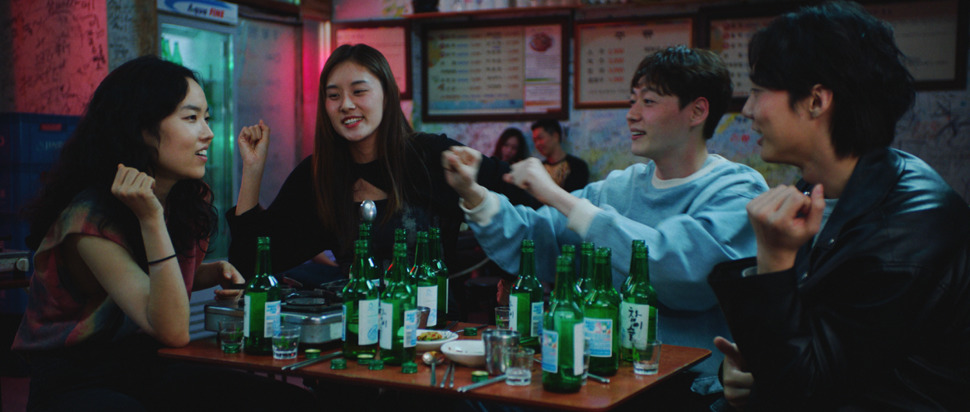Davy Chou on Return to Seoul
In Return to Seoul, Cambodian-French filmmaker Davy Chou tells the story of a Korean adoptee travelling to her homeland. Chou explains how the idea initially sprang from a friend's similar journey but eventually realised how personal the film was
In 2011, Cambodian-French filmmaker Davy Chou found himself on an intercity bus in South Korea. His friend, a Korean adoptee who he’d met studying in Paris, had impulsively asked her biological father to meet her. She asked Chou, “Do you want to come with me?”
The director said yes. Ninety minutes later, he was face-to-face with his friend’s biological father and grandmother, bearing witness to a vignette of such strange and emotional turmoil that he was unable to forget it for years. “That moment of her facing them,” Chou recalls, “and the fact that although they wanted to communicate, they couldn’t – because of the barriers of culture, language, feeling and time. That powerlessness on both sides hit me hard. I thought of it constantly.” In 2017, he would begin to alchemise that moment into a film: the mercurial Return to Seoul.
An adoption drama that shimmers with unease, never quite able to settle, Return to Seoul is opposed to the archetypal ‘journey to the roots’ story as a linear quest for self-discovery. Frédérique ‘Freddie’ Benoit, a 25-year-old French-raised Korean adoptee, arrives in Seoul high-strung with the tension of two opposing desires: to vehemently resist anyone’s attempt to define her by her Koreanness; and to figure out why she nevertheless finds herself irresistibly pulled into her foreign homeland.
“I was intuitively attracted to the possibility of offering a counter-narrative to those typical stories,” Chou says. Spanning eight years across multiple time jumps, Return to Seoul is a sawtooth portrait of a woman whose personhood becomes inseparable from constant attempts to reinvent it: an almost pathological avoidance of solidity or stillness. Her hair changes, her clothes change, the jobs she takes on, the men she fucks. Yet still, she orbits around Seoul, both drawn to and repelled by the existence of her biological parents somewhere on the peninsula. “A character arriving at a comfort zone would feel disappointing, because it’s taking out the complexity of real-life experience,” Chou elaborates. “Only time leads us to understand multiple answers, multiple identities.”
Time is essential to Chou’s film, which repeatedly destabilises the audience with its non-linear structure. “I was excited about offering a different experience of how you feel about the time spent with the character,” says Chou. “[The film] unfolds with the surprise of having gaps in the narrative. It’s a bit risky, but I think that’s what cinema is.”
In writing Freddie’s story, Chou would arrive at some answers of his own. “At the beginning, I was blind enough not to see how personal this story was to me,” he shares. “I was asking myself that question of legitimacy: ‘Why do I make this story if it’s not mine?’ The moment I was ready to give up, something suddenly turned a light on: my god, that’s also my story in a way.” At the age of 25 – the same age as Freddie – Chou decided to go to Cambodia, where his parents were born. “I came with that self-assured overconfidence, like Freddie, being very certain of my identity," he recalls. "I was taught to repeat: ‘I have the French culture, French education; in conclusion, I’m French’. Facing Cambodian people my age, they were very sceptical: saying, ‘Don’t you think it’s a bit more complex than that?’” Chou laughs. “It was brutal.”
The film’s twisty narrative is given flesh-and-blood in an astonishing performance by first-time actor Park Ji-min: impossible to tear your eyes away from as she leaves collateral damage everywhere in her wake. “I found Ji-min through a common friend,“ says Chou. “I had talked to him extensively about my film, and he said, ‘You should meet this girl. She’s not an adoptee, she’s not an actress. But somehow, everything you said about Freddie reminds me of her.’”
When he eventually met Park, Chou was struck by the feeling that he was already “in front of some kind of alter ego of Freddie”. Freddie became a chimera: the personality of Chou’s friend hybridised with Chou’s own experiences living between Paris and Phnom Penh, and then it sharpened thanks to Park’s challenges to the script. “Ji-min felt unsatisfied with many things [regarding] the portrayal of her experience as an Asian woman in France,” Chou says. “She rewrote the character design in terms of clothes, the precise nature of the relationships she has with male characters, female characters, and Asian characters. So if Freddie looks to be a bit special,” he smiles, “it’s the result of those multiple transformations.”
Weaving between French, Korean, and English, the film is also a fascinating exploration of translation – as not simply a linguistic process, but a constantly troubling negotiation of emotion. “Translation is a question of distance,” Chou says. “How do you find the right way to synchronise yourself?” Return to Seoul is an ode to seeking those moments of synchronisation, even if they never come so easily.
Return to Seoul is released 5 May by MUBI
